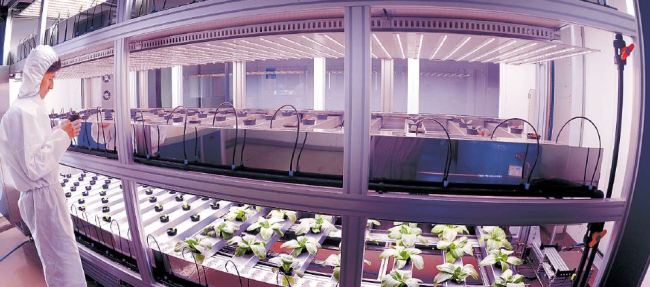While a UN report says agriculture has to produce 70 percent more food in 2050 than it did in 2006 to feed the world’s growing population, South Korea’s state-run agricultural think tank is busy experimenting how to turn agriculture into something like manufacturing to feed the future generations.
Located in Wanju, North Jeolla Province, the National Institute of Agricultural Science operates a smart greenhouse to experiment vertical farming, researches on insect farming and preserves tens of thousands of seeds in preparation for international disputes over patented plants.

The smart greenhouse is filled with vegetables growing under the LED lights of blue and red, to find the best options of artificial lights for growing food against the odds of bad weather. The smart greenhouse was once called the “plant factory” but the name was changed due to a bad impression coming from the word “factory,” according to the institute. Vegetables and fruits growing here include cherry tomatoes, bell peppers and melons. Medicinal crops and flowering plants are also under being experimented with.
Another lab is growing edible insects that will be the food of the future. Already, four edible insects -- mealworm, protaetia brevitarsis, beetle larvae and a kind of cricket gryllus bimaculatus -- have been approved as food ingredients and are expected to arrive on our dining table soon.
The institute also has a seed bank where more than 400,000 seeds are preserved, for the short term to the long term at 4 to minus 196 degrees Celsius, for future food production.
Photographed by Park Hyun-koo
Written by Kim Yoon-mi








